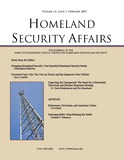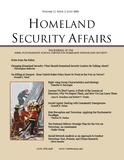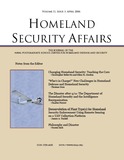Homeland Security Affairs Journal, Volume III - 2007: Issue 1, February

Download
Author
Naval Postgraduate School Center for Homeland Defense and Security (CHDS)
Date
2007-02Metadata
Show full item recordAbstract
February 2007. The articles in this issue of Homeland Security Affairs demonstrate the arc of homeland security studies – from how we think about and address terrorism to how we communicate with one another when dealing with the immediate aftermath of a terrorist attack or natural disaster. Illustrating the arc those studies have followed in the past five years, Christopher Bellavita offers “Changing Homeland Security: Ten Essential Homeland Security Books”, reviewing works he believes outline a broad historical narrative about homeland security: we were attacked, we worked to develop a strategy to prevent future attacks, and then we took the first steps to institutionalizing the study and development of homeland security and defense. Analyzing works as diverse as the 9/11 Report, Imperial Hubris, and the Constitution of the United States, Bellavita argues that the process we are going through as a country (as demonstrated in these ten works and including recent criticism of current policies) is natural and necessary. He concludes with the Articles of Confederation (1777) to remind us that, like this country’s founders, “we should not exclude the possibility of rethinking, as a nation, how we approach homeland security.” One of the authors included in Bellavita’s “Ten Essential Homeland Security Books” – Ian Lustick – questions the validity of our attitude toward terrorism with his essay, “Fractured Fairy Tale: The War on Terror and the Emperor’s New Clothes.” Lustick points out that while the War on Terror is championed by nearly every politician in this country, none of the myriad public opinion polls taken in the past five years has asked one essential question: “Do you think there should be a War on Terror?” Politicians, bolstered by movies, television shows, and the nightly news have presented an America locked in a death struggle with terrorism. This so-called “war,” argues Lustick, is a chimera created to justify keeping U.S. troops in Iraq when, in fact, the nation has been subject to no terrorist attacks – nor have any terrorist cells been found within our borders – since 9/11. He examines how the War on Terror was triggered, how it sustains itself, and how it conceals its irrationality. Irrational or not, many commentators still discuss the need to deter terrorism, at home and abroad. Uri Fisher explores the practical obstacles to applying deterrence in counterterrorism policy in his article, “Deterrence, Terrorism, and American Values.” He examines the motivations of terrorists and those governments that offer them support and concludes that our standard arsenal of sanctions and diplomatic negotiations are ineffective in dealing with the threat. Fisher argues that while deterrence may, in theory, be a viable approach to defending against terrorism, the U.S. is unlikely to adopt the tactics most likely to deter terrorist organizations: namely, a demonstrated willingness to use nuclear weapons against countries that aid terrorist organizations and the use of targeted killings against individual actors. Such tactics, and the policies that support them, says Fisher, are in direct opposition to American values and morals. Given that we will not necessarily succeed in deterring terrorist attacks, how do we respond in the event of such attacks or to natural disasters? W. David Stephenson and Eric Bonabeau suggest that the current hierarchical, government-directed approach is fundamentally mismatched to the challenge of response. In “Expecting the Unexpected: The Need for a Networked Terrorism and Disaster Response Strategy,” they argue that terrorist attacks or natural disasters are likely to be so unpredictable that they will frequently require improvised responses. The most effective of these responses are those that exhibit “swarm intelligence” – the ability of a community, even an ad hoc one, to demonstrate a higher level of collective behavior than could be predicted from the capabilities of individual members. As examples of swarm intelligence, Stephenson and Bonabeau point to the actions of passengers aboard United Flight 93 and the hundreds of individuals who created, contributed to, and continue to maintain the tsunamihelp and katrinahelp blogs. What is needed in disaster response, Stephenson and Bonabeau contend, is a flexible and highly adaptive networked structure, utilizing readily available technology to foster swarm intelligence. With “Interoperability: Stop Blaming the Radio,” Ronald Timmons looks at another, related aspect of disaster response: communication between first responders. While acknowledging the need for improved radio hardware, he points out that the grant funding provided to patch radio systems together ignores the human factors that impact emergency responders. Through a detailed review of after-action reports from 9/11, Katrina, and other disasters, Timmons identifies factors beyond radio infrastructure that hamper interoperable communication. These factors include behavioral reactions by people in stressful situations, interagency relationships, and inadequate procedures and training. Timmons argues we have, perhaps, become overly reliant on technological solutions and should instead focus on providing proper training in the use of communication equipment while establishing new policies for emergency scene responders.
Description
Homeland Security Affairs is the peer-reviewed online journal of the Naval Postgraduate School Center for Homeland Defense and Security (CHDS), providing a forum to propose and debate strategies, policies, and organizational arrangements to strengthen U.S. homeland security. The instructors, participants, alumni, and partners of CHDS represent the leading subject matter experts and practitioners in the field of homeland security.
Rights
Copyright © 2014 by the author(s). Homeland Security Affairs is an academic journal available free of charge to individuals and institutions. Because the purpose of this publication is the widest possible dissemination of knowledge, copies of this journal and the articles contained herein may be printed or downloaded and redistributed for personal, research or educational purposes free of charge and without permission. Any commercial use of Homeland Security Affairs or the articles published herein is expressly prohibited without the written consent of the copyright holder. The copyright of all articles published in Homeland Security Affairs rests with the author(s) of the article.Collections
Related items
Showing items related by title, author, creator and subject.
-
Homeland Security Affairs Journal, Volume II - 2006: Issue 2, July
Naval Postgraduate School Center for Homeland Defense and Security (CHDS) (Monterey, California. Naval Postgraduate SchoolCenter for Homeland Defense and Security, 2006-07);July 2006. The July 2006 issue of Homeland Security Affairs offers articles about risk perception, domestic right wing extremist groups, social network analysis, and the impact of foreign policy on homeland security. It ... -
Homeland Security Affairs Journal, Volume II - 2006: Issue 1, April
Naval Postgraduate School Center for Homeland Defense and Security (CHDS) (Monterey, California. Naval Postgraduate SchoolCenter for Homeland Defense and Security, 2006-04);April 2006. Welcome to the third edition of Homeland Security Affairs. Our Spring 2006 issue features articles about intelligence and homeland security, the demarcations between homeland defense and security, and ideas ... -
Homeland Security Affairs Journal, Volume I - 2005: Issue 1, Summer
Naval Postgraduate School Center for Homeland Defense and Security (CHDS) (Monterey, California. Naval Postgraduate SchoolCenter for Homeland Defense and Security, 2005-06);June 2005. We are pleased to present the inaugural issue of Homeland Security Affairs. The primary goal of the journal is to be the academic publication that furthers the discussion and debate of important elements that ...


 HSAJ_2007-02.pdf (2.183Mb)
HSAJ_2007-02.pdf (2.183Mb)

